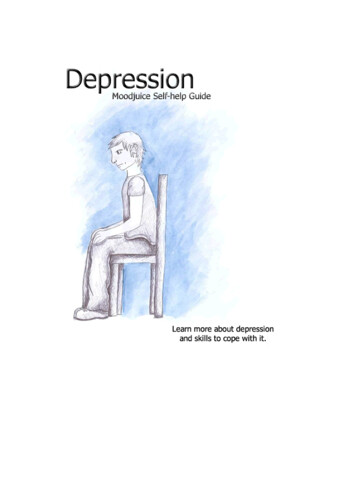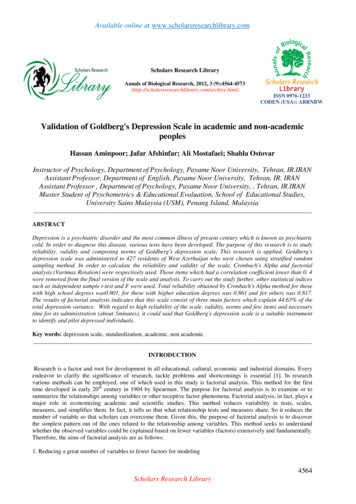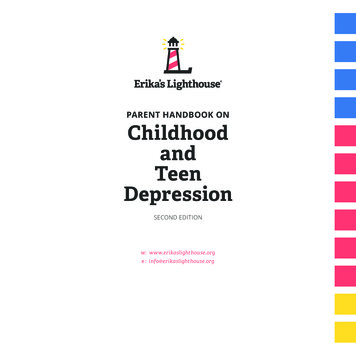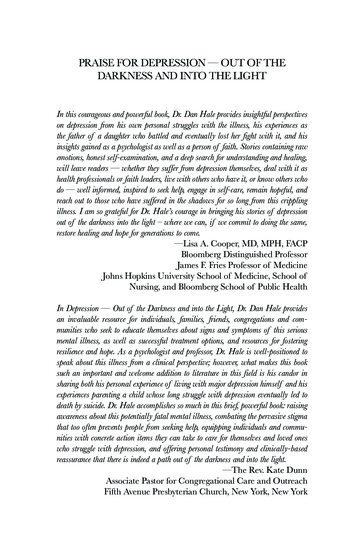
Transcription
Self Help for Depression Do you find that your mood is low for large periods of the day and you generally feel'down in the dumps'?Has your motivation to do things you previously enjoyed decreased?Do you often feel weepy or irritable?Do you feel that things are getting on top of you?Do you find that your confidence is low and you generally have a poor opinion ofyourself?If the answer to any of these questions is 'yes’, you may be experiencing symptoms ofdepression and you may find this workbook helpful.This workbook aims to help you to: Recognise whether you may be experiencing symptoms of depression.Understand what depression is, what causes it and what keeps it going.Find ways to understand, manage or overcome your depression.2
Do I have symptoms of depression?If you experience symptoms of depression or low moods it is likely that you will recognise manyof the feelings, physical symptoms, thoughts and behaviour patterns described below.Please tick the boxes which regularly apply to you.FeelingsSad / Low / FlatUpsetMiserableTearfulIrritable/low patience thresholdLonelyUnmotivatedPhysical SymptomsPoor concentrationPoor memory Increase or decrease in appetiteLethargic/lacking in energySleeping too much or too littleThoughtsNo-one likes meI'm a waste of spaceI'm no goodThings will never changeI'm a failure/I'm going to failI can't be botheredIt's not worth going onBehaviour PatternsSpending more and more time aloneStaying in bed longer than usualKeeping to yourselfStopped doing the things you enjoyIf you have ticked a number of these boxes it is possible that you experience symptoms of lowmood or depression. However don't be alarmed, this is a common problem that can beovercome. By following the steps in this workbook, you may be able to learn how to improveyour situation.3
What is depression?Everyone feels 'low,' 'down in the dumps,' 'blue,' or like they 'can't be bothered' from time totime. Depression is essentially a more extreme form of this. For example, depression tends todescribe when these feelings last for most of the day, over an extended period of time. Whendepressed, people also find that their motivation is low, their appetite is reduced, their sleepingpatterns are disrupted and their concentration and memory are poor. Other typical experiencesinclude feeling irritable, weepy and lonely.People who are low or depressed normally have a critical way of thinking about:Themselves: I'm boring I'm Ugly I'm a failureOthers: No-one likes me Everyone is better than meThe future: Things will never get better What's the point?People's behaviour patterns also typically change if they low or depressed. For example, theytend to spend a lot of their time indoors (often in bed) and don't socialise or do as much as theyused to.4
What causes depression?Life Events:We can feel depressed for a variety of reasons. Howeveroften depression can follow difficult experiences (such as abereavement, being bullied or the end of a relationship). It isnormal to feel low during such times and often these feelingspass naturally with time, but unfortunately sometimes theystick around for longer and become problematic. On the otherhand, sometimes depression can seem like it comes 'out ofthe blue' for no particular reason at all.Thinking Styles:One theory suggests that the way we interpret, or think aboutthings, can lead us to feel depressed. This is because howwe think affects our emotions. For example, if you walkedpast a friend in the town centre and they ignored you, it wouldbe easy to think this was because you've upset them, or thatthey dislike you. Of course having such thoughts wouldnaturally cause you to feel upset and bring you down. On theother hand, if you instead thought; "perhaps they weredaydreaming and didn't notice me," you would likely feelbetter about yourself. When we are depressed, we commonlythink about situations in an overly negative manner (asdescribed above) and this has a negative impact on ourmood.Behavioural Explanations:Another popular theory is that depression can occur becausewe stop doing many of the things we used to enjoy (such associalising with friends and participating in our hobbies). Thisoften means we have little to look forward to which can makeour lives seem boring and meaningless. Instead when we aredepressed we tend to spend most of our time alone or sittingin front of the TV and this can become very unrewarding andunsatisfying.Biological Reasons:It has also been shown that depression can have familial ties.For example, if someone in your immediate family hasexperienced depression, there is an increased chance thatyou will develop similar feelings. It is therefore thought thatour genetic make up plays a role.In reality it is likely that a combination of all these factors play a role in people becomingdepressed or low. However, in some ways it is less important to know what causes depressionand more important to know what stops us moving past it.5
What keeps our depression going?When people are depressed, they often have a negative way of looking at themselves, theworld and their futures. Some believe that people's tendency to think in this negative fashion isone of the important factors in ensuring their depression continues. It clouds the way theyinterpret situations and helps ensure they continue to have a negative outlook on life.Furthermore when people feel depressed or low, they often stop being as active as normal, andspend less time socialising or engaging in their hobbies. This means that they have lesspleasure in their lives and little to look forward to on a day to day basis, which too can keepthem feeling low. Furthermore, when they are inactive, it normally leads to them feeling evenmore lethargic, which makes it even more difficult to escape this trap and a vicious cycleoccurs.Similarly, people who are depressed or low, often spend a lot of time lying in bed or sittingaround watching TV. Often this leads to people feeling as though they have wasted their dayand have achieved very little which makes them feel even worse. It also leaves them with plentyof time to beat themselves up or worry about their problems, which of course also makes themfeel worse.When looking more closely at what stops us overcoming our depression, it becomes clear thatour behaviour, thoughts, feelings and physical sensations all interact and combine to keep ourdepression going. See the diagram below:6
7
How can I overcome my depression?Fortunately, there are a number of strategies that we can use to overcome depression and lowmoods. These include:1. Learning how to challenge your unhelpful thoughts and see things in a more realisticlight.2. Learning strategies that can help you become more active and make good use of yourtime.3. Improving your problem solving skills.4. Learning ways to help you notice your qualities and achievements.When going through this booklet it can sometimes be more helpful to try out the ideas aboveone at a time, rather and trying to learn them all at once. However simply take things at yourown pace.8
Challenging unhelpful thoughtsThe way that we think about things has an impact on our mood. Many of these thoughts occuroutside of our control, and can be negative or unhelpful. It is therefore important to rememberthat they are just thoughts, without any real basis, and are not necessarily facts. Even thoughwe may believe a lot of our unhelpful thoughts when we are depressed, it is good to rememberthat they should be questioned as they are often based on wrong assumptions.The following section will help you begin to recognise if you are thinking about things in anunhelpful or unrealistic way, and discuss how you can start to make changes to this. By doingso, you can learn to see things in a more realistic light which can help to improve your mood.You might have unhelpful thoughts about all kinds of things.Here are some examples:Yourself: I'm boring I'm ugly I'm a failureOthers: No-one likes me People are out to get me Everyone is better than meThe world: Life is unfair The world is a horrible placeThe future: Things will never get better What's the point of continuing I'm destined to failIt is clear to see how this kind of thinking might bring your mood and confidence levels down.Do you ever think in any of the ways outlined above? Fill in your examples below:You might find it difficult to identify an unhelpful thought. Try thinking about a time when yourmood changed. Consider what was running through your mind at that time.9
Patterns of unhelpful thinkingFirst you need to be able to recognise an unhelpful thought. Then you can challenge it. Beingaware of the common patterns that unhelpful thoughts follow can help you to recognise whenyou have them. Here are some of the common patterns that our unhelpful thoughts follow:Predicting the Future:When we are depressed, it is common for us to spend a lot oftime thinking about the future and predicting what could gowrong, rather than just letting things be. In the end most ofour predictions don't happen and we have wasted time andenergy being worried and upset about them. For example:You have an exam and spend the week before predicting youwill fail, despite all your hard work studying and your previousgood grades.Mind Reading:This means that you make assumptions about others' beliefswithout having any real evidence to support them.For example: My boss thinks I'm stupid. People think I'm weird.Such ways of thinking can soon lower our mood and selfesteem.Catastrophising:People commonly 'catastrophise' when they are feeling low,which basically means that they often blow things out ofproportion.For example: They assume that something that has happened is farworse than it really is (e.g. that their friend is going todislike them because they cancelled a night out). They may think that something terrible is going tohappen in the future, when, in reality, there is verylittle evidence to support it (e.g. I'm going to get intoserious trouble for calling in sick).Taking Things Personally:When people are feeling low, they often take things to heart.For example: Because one of your workmates seem quiet, youassume that it is down to something you said. Insteadin all likelihood, they are probably just having a badday and will be back to their usual self tomorrow.10
Should Statements:People often imagine how they would like things to beor how they 'should be' rather than accepting how thingsreally are.For example: I should have more friends. I should be more confident at parties.Unfortunately when we do this, we are simply being critical ofourselves which brings us down. Instead it can sometimeshelp to accept that things can't always be perfect.Over Generalising:Based on one isolated incident you assume that all others willfollow a similar pattern in the future. Basically, you find it hardto see a negative event as a one off which can leave youfeeling hopeless.For example: After failing your driving test, you assume that you willfail everything else that you try in the future.What If Statements:Have you ever wondered "what if" something bad happens?For example: What if I go to a party and no-one talks to me? What if I make no friends when I start my new job?This type of thought can often make us avoid going places ordoing things that we would like and enjoy which too cancontribute to us feeling low.Black and White Thinking:Often when feeling low, people see things as either black orwhite, there is no in between.For example: They will only accept an A in maths as good, a B oranything lower is a complete failure. This too can make people feel as though things arenever good enough which can contribute to low mood.Ignoring the Positives:Often people can ignore the positive aspects of life orsituations, and instead focus on the negative elements.For example: You focus on the one person who dislikes you andforget that you have many friends.This style of thinking stops us feeling good about ourselvesand lowers our confidence.11
Labelling:People who are low often label themselves in negative ways.For example: I'm no good. I'm not worthy. I'm a failure. I'm boring.It is easy to see how labelling yourself in such a way wouldlower your confidence and mood.Do any of your unhelpful thoughts follow some of these patterns? Jot down any examples youcan think of into the box below:We can learn techniques to challenge these unhelpful thoughts. This can help to improve yourmood. The next part of this handout will discuss how we can go about challenging our unhelpfulthoughts. You may come up with a more balanced thought that is accurate and based onevidence.12
How to challenge unhelpful thoughtsOnce you have recognised an unhelpful thought the next stage is to challenge it. To do this, youcan ask yourself a serious of questions. See the example below:Situation: My partner hasn't called me after saying they would.How you feel: Sad, empty and tearful.Unhelpful thought: They're getting fed up with me!Challenges to an unhelpful thoughtNow you can challenge your unhelpful thoughts by asking these questions.Is there any evidence that contradicts this thought? We were recently talking about moving in together one day.We've been getting on really well lately.Can you identify any of the patterns of unhelpful thinking described earlier? I'm catastrophising. Based on their failure to call, I'm jumping to worst possibleconclusion.I'm also mind reading and ignoring the positives.What would you say to a friend who had this thought in a similar situation? I'd say - they're probably just busy, stop stressing; they'll no doubt call soon.What are the costs and benefits of thinking in this way? Costs: It's really getting me down and I can't concentrate on anything else. I'malso feeling sick with worry.Benefits: I can't really think of any.Is there a proactive solution to this unhelpful thought? I could give them a quick call to see how they're getting on.Is there another way of looking at this situation? They're probably just busy and will call soonOnce you have asked yourself these questions, you should read through your answers. Try tocome up with a more balanced or rational view. For example:I'm sure there'll be a good explanation as I don't have any evidence that suggeststhey're fed up with me.Try to apply these questions to the unhelpful thoughts that you notice. It can help to improveyour mood. You can use this technique to test your thoughts are realistic and balanced.13
14
Making Good Use of Your TimeWhen we feel are depressed, our motivation to do things often decreases. You may find thatyou give up hobbies or activities that you previously enjoyed. Over time you might end up doingvery little. This can lead you to feel even lower and a cycle can begin which is difficult to escapefrom.By using a diary to plan your week in advance, you may be able to domore of the things you want to, in addition to the things that you have todo. This can really help to lift your mood. This section aims to give youadvice that will help you to plan your weeks well.When completing your diary, start by filling in all the activities that youhave to do. For example, preparing meals, doing housework, attendingappointments, etc. This will show you all the time that you have free.Then you can begin to plan other activities that you would like to do.Remember to pace yourself. Give yourself space to be busy or take timeout to relax. You may find it helpful to plan in some time for: Socialising - social contact often helps us feel better, even though you may not feel likeit at times.Hobbies and interests - this might be something you have enjoyed in the past, or a newproject.Exercise - this can improve your mood and general health. It doesn't need to beanything too energetic. Just going for a walk regularly can be a good option.Bedtimes - try to plan regular and consistent bedtimes. Having a regular sleepingpattern can help improve your mood and energy levels.Time for yourself - make time to relax and give yourself space between activities.Some ideas have been provided in the box below that may help you get started. We all havedifferent interests, so try to do things that you know will work for you. Fill in your ideas in thespace provided:Now try to complete a plan for a week. You don't have to fill in every space - this can be quitedifficult. You could start by just adding in one or two new activities for each day.Once you have filled in your diary, all you have to do is try to follow your plan each day. Don'tworry if unexpected things come up and you cannot stick to it exactly. In fact, it is very unlikelythat things will go exactly as you planned. It is also fine to be flexible and replace someactivities with new ones. Leave out some tasks altogether if you don't have time for them. Try tobe relaxed if this happens.15
16
Problem SolvingYou might find it more difficult to cope if you have lots of problems that you can't seem to get ontop of. This can have a clear impact on our mood. Struggling with unresolved problems canoften make us feel worse. We can end up worrying or ruminating over our problems withoutfinding a way to resolve them. This can make us feel even more upset, and can end upinterfering with our sleep.It can help to develop a structured way of working through a problem. Beginning to overcomesome of your problems might help you to feel better. You can improve your problem solvingskills by learning to apply the steps outlined here.Identify your problemThe first thing to ask yourself is “what is the problem”? Try to be as specific aspossible.For example: "I owe 400 to my friend.” "I am going to miss this deadline."Come up with possible solutionsTry to list every way that you can think to overcome your problem. Don't worry abouthow unrealistic an idea seems. Write down anything and everything. The bestsolutions are likely to be the ones you think of yourself. This is because nobody reallyknows your situation as well as you do.It may help to consider: How you might have solved similar problems in the past. What your friends or family would advise. How you would like to see yourself tackling the problem.Choose a solutionNext you need to select the best solution from your list. Think carefully about eachoption. It is useful to go through all the reasons 'for' and 'against' each idea. This willhelp you to make a good decision and select the best solution.After this you may find that you are still unsure. Perhaps a couple of approaches seem equallygood. Try to pick one to begin with. If it doesn't work then you can always go back and try out adifferent one later.17
Break down your solutionTo help you carry out your chosen solution, it can be useful to break it down intosmaller steps. This can make it easier and more manageable to follow through. Thenumber of steps required will vary depending on the solution and how complex it is.For example:Someone with debt may have decided to try and resolve their problem by getting apart time job. This would require several steps.1.2.3.4.5.6.Buying a newspaper with job adverts.Choosing which jobs to apply for.Creating a CV.Sending out their CV.Buying interview clothes.Preparing answers to potential interview questions.Try out your solution and review the outcomeFollow the steps required to carry out your solution. Simply take them one at a time.Go at your own pace and don't allow yourself to feel too rushed.Once you have completed all the steps, you should then review the outcome. If youhave successfully resolved your problem then great. If the problem still exists thendon't give up. Is there another solution on your list that you could try?Is there a different solution that you have yet to consider?Can you ask someone else if they have any ideas or advice?Can you combine any of your solutions?It is useful to remember that not all problems are within our control. This can make it reallydifficult if not impossible to resolve using the steps above. Perhaps you will have to wait, or asksomeone else to take action instead. In such a situation, try not to worry. Nothing can begained from worrying about something that you have no control over.18
19
Recognising your qualities and achievementsThroughout life we often only remember the bad things that people have said about us or thetimes we feel like we have failed. This unsurprisingly lowers our mood and self-esteem. Youcan change this by beginning to remember the skills you have, the qualities you have and theachievements you have made. The evidence is there if you look for it!It can help to consider: Things you do well.Things you have achieved.Times you did something even when it was hard.Things you know a lot about.Things you can do easily and quickly.Evidence that shows you are good at something.Things that you do that people have thanked you for.Times you were helpful to others.Evidence that people like you.Compliments you have been given.Qualities you have.Anything that shows you have been appreciated.Times when people have been nice to you or did you a favour.Note down the evidenceStart by considering the evidence from the past and present and noting it down; it maylook something like this: I always have time for my friends.I stay calm in a crisis.My friend always says I'm funny.I was invited to my work mates' house for tea.I'm normally really well organised.My boss asked me to take on an extra project last week.My work mate brought me back a souvenir from their holidays.I have a responsible job.Keep adding to the list Continually add more examples to the list as they happen in the future, nomatter how small they may seem.Keeping these examples in mind Study the list everyday, especially at times when you are feeling low.20
Final WordWe hope that you found some of the ideas in this bookletuseful. You can continue to use the techniques you foundhelpful long into the future and they should continue to benefityou. If some of the ideas are not particularly helpful at first, it isperhaps worth sticking with them for a few weeks to give thema chance to work. If however you feel your situation remainslargely unchanged or if you did not find this booklet useful, youshould speak to your GP who can tell you about the otheroptions available which you could find helpful.Further Information and ResourcesFor further information and self-help resources go to Moodjuice online:http://www.moodjuice.scot.nhs.ukMoodjuice is a website designed to offer information and advice to those experiencingtroublesome thoughts, feelings and behaviours. In the site you can explore various aspects ofyour life that may be causing you distress and obtain information that will allow you to helpyourself. This includes details of organisations, services and other resources that can offersupport. This self help guide comes from a series that you can access and print fromMoodjuice.Other titles available include: Anger Anxiety Assertiveness Bereavement Chronic Pain Depression Obsessions and Compulsions Panic Phobias Post Traumatic Stress Shyness and Social Phobia Sleep Problems Stress21
Self Help for Depression Do you find that your mood is low for large periods of the day and you generally feel 'down in the dumps'? Has your motivation to do things you previously enjoyed decreased? Do you often feel weepy or irritable? Do you feel that things are getting on top of you? Do you find that your c










